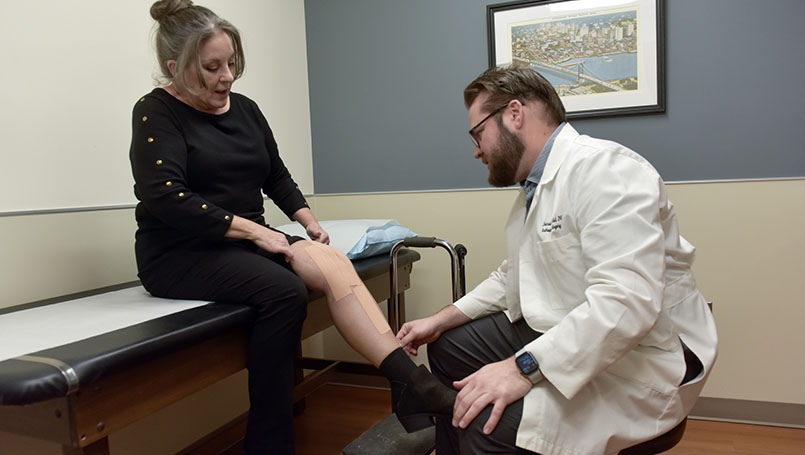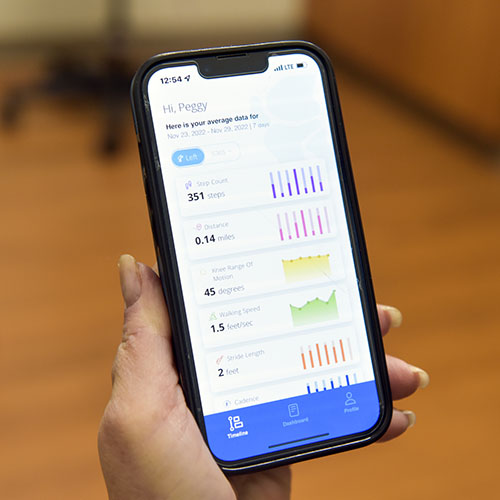Wednesday, December 07, 2022

New technology informs individual recovery, will be used to improve future innovations
Peggy Drake isn’t the kind of person to let knee pain come between her and the things she wants to do, whether it’s caring for her grandchildren, driving cross-country to settle a family member’s estate or renovating her home.
“I was very involved with sheet rocking and putting up the crown molding,” said Drake, who became Corewell Health East’s first smart knee recipient Nov. 5. “I got through every room in the house but two. It’s hard for me to just sit here when I know there are rooms that still need to be gutted.”
To be clear, Drake isn’t just “sitting” there.
She’s driving, shopping and responding to strategic requests from one of two new phone apps she downloaded to her smart phone prior to surgery. Powered by her home’s Wi-Fi system and linked to the technology implanted in her knee, the app tells her when it would be most helpful to walk around her house, climb up and down stairs or do leg lifts.

“I really like it,” Drake said. “It’s a bit like having a personal trainer. Or a coach. I’ve always been a self-starter, and so, I appreciate the opportunity to rehab and follow through on my own exercise program.”
Drake’s physician, Daniel McCall, D.O., an orthopedic surgeon for Corewell Health Farmington Hills Hospital, the new name for Beaumont Hospital, Farmington Hills, said smart knee technology enables him to monitor patient progress and mobility, pain level and pain management.
“This technology lets me know if a patient is doing really well or falling behind, if they’re experiencing a higher than typical pain level and whether they are following their medication schedule as prescribed. Down the line, we hope to use it to determine if an infection is developing, if the implant is getting loose, and to improve how we do knee replacements in the future.”
Not only does the collected data contribute to the individual recovery of the patient, it is also entered into a collective database that informs the treatment and recovery process for future patients. The program does not track a patient’s location.
“I get a kick out of the fact my experience might be able to help someone else,” Drake said. “I’m a part of something bigger than myself.”
Additionally, the smart knee transplant does the following:
- Captures key kinematic data metrics that help physicians monitor and guide post-surgery treatment
- Provides patient-specific data for at least ten years
- Encourages patient compliance
- Enables a physician to continue to monitor patient progress even when the patient leaves the area for periods of time, for example, snowbirds
Ideal candidates, Dr. McCall said, are those interested in and willing to embrace the technology.

“After just a week and half, I was walking up and down the stairs,” said Drake, who was unable to walk without a walker before her surgery. “Three weeks post-op, I wasn’t even using a cane anymore. I exercise twice a day. I don’t have that horrible knee pain anymore. Other than the surgical pain, it’s all gone.”
Although she promised Dr. McCall she won’t get down on her knees for four or five months post-op, she said: “I think that’s why they selected me for the surgery… I’m not a rebel. They knew I’d do everything they asked of me.” But she can’t help thinking about the bathroom and kitchen that still need to be remodeled.
Drake is also planning a New Year’s Eve party.
“Picking out paint colors and ordering catered food isn’t hurting anything,” Drake said with a laugh. “I don’t want to waste any more time in my life because of a bad knee.”
